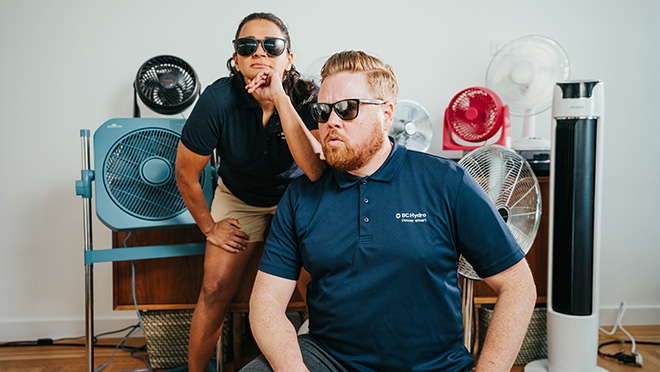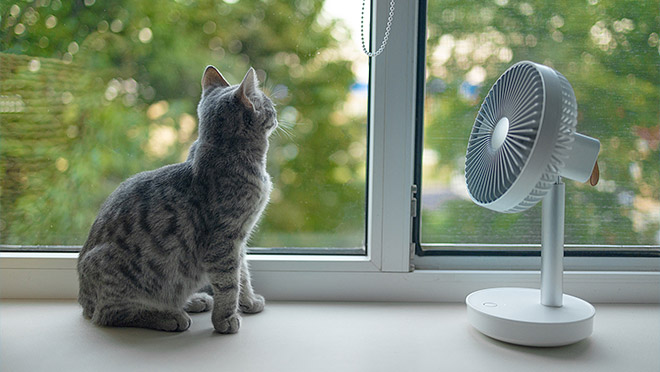10 ways to stay cool this summer

Are you ready for a hot summer?
While our weather is unpredictable, extreme heat is now inevitable. So we're here to offer you insights and advice on how to stay cool, plus news of in-store, instant $50 rebates on qualifying portable and window air conditioners and air purifiers.
AC and air purifier rebates are here today
This summer, enjoy instant discounts on high-efficiency room air conditioners and air purifiers. Through August 23, 2024, get $50 off select energy efficient room air conditioners and $30 off select ENERGY STAR® air purifiers.
Get details, including the list of qualifying models, on our rebates page. And do a deep dive into which are most efficient in our Power Smart Shop.
If you're going to need a fan, don't wait until it's hot
We see it every year. There's a run on cooling fans as soon as a heat wave hits, then many of us are left scrambling to find the right model, at the right price, as supplies are exhausted. So do your research now, and get the fan(s) you need.
And use fans strategically. Rule number one is to only use fans in rooms where there are people, and only when there's someone in the room. Unless they're placed near an open window to draw cooler air in from the outside, fans don't actually cool a room. The air they move, however, cools our skin and makes us feel more comfortable.
Open and close windows according to outside temperature
Air flow is everything. Open and close windows, blinds, and doors strategically, and your home will be much more comfortable when the heat arrives.
The concept is simple. Close windows and doors as soon as the air outside is warmer than it is inside your home, then open them when the air outside is cooler – usually later in the evening and the early morning. In multi-level homes, a window cracked in the basement or first level can work wonders when combined with a window opened on the upper level, creating a flow of air and flushing out heat in the home. Just be careful to ensure your opened windows won't create a security issue, especially on ground floors.
Don't wait too long to close the blinds or drapes in the morning. That east or south facing window may be getting bombarded by the sun, and stopping heat from entering your home in the first place is key.
Take the heat out of the kitchen
Hot days and kitchen ovens don't mix. When you use that big appliance on a hot day, it just makes your home less comfortable. So use a small appliance to make dinner, opt for the barbecue, or go for salads, smoothies, or cold meat and cheese plates. And if your home is really, really uncomfortable, get outside: pack for a picnic at the beach or at a park full of trees.
Consider switching to a heat pump
Before you run out and buy an air conditioner, consider what an air source heat pump can do for you. It's the most efficient way to deliver year-round comfort, and while it's called a "heat" pump, it's a superstar when it comes to cooling your home. Plus, did you know you could save up to $2,000 on a heat pump if your home is electrically heated, or up to $3,000 if that heat pump replaces a natural gas, oil, or propane furnace?
Learn more about using a heat pump as an air conditioner, and how the math on heat pump installations has changed.
If you feel you need an air conditioner, make sure it's energy efficient
If you're buying a central or window air conditioner, make it ENERGY STAR. Natural Resources Canada has a list of ENERGY STAR-certified air conditioners for central and room A/C units. But the easiest way to find an efficient unit is to look for the ENERGY STAR label.
By replacing your old air conditioner with an ENERGY STAR qualified model, you can realize substantial savings in electricity costs. Today's ENERGY STAR units use up to 40% less energy than most models sold 10 to 15 years ago.
If you're buying a portable air conditioner, the ENERGY STAR certification isn't available. Instead, look for efficient features like dual-duct design, variable speed or inverter technology, and a high CEER rating.
Don't set your air conditioner or heat pump too low
The lower you set your thermostat in summer, the more it will cost you. We recommend setting air conditioners to 25°C, which should be cool enough to keep you comfortable.
If you have a heat pump, set the temperature and forget it. That's the most efficient way to cool your home. Learn more about using a heat pump efficiently.
If you have an air conditioner, shut it off if you leave home for an hour or more.
Don't underestimate the power of blinds and drapes
The best way to keep your home comfortable is to limit the ability of the summer sun to heat things up in the first place. So in addition to closing windows and doors whenever it's warmer outside than inside, block the sun from entering rooms by closing windows and blinds on the south and west sides of your home in particular. On an extremely hot day, you may also find the early morning sun from the east worth blocking, too.
Plant a bush or deciduous shade tree
As summers get warmer in B.C., cities and municipalities are trying to increase the tree canopy to keep neighbourhoods from overheating. And a well-placed bush or shade tree outside your home can block the sun's rays from reaching your windows in the summer. If it's a deciduous tree, the leaves will be gone in time to allow the sun to warm your home in the cooler months.
Learn more about shade trees and eco gardening.
Draftproof doors and windows for summer, too
Using weatherstripping and caulking to plug leaks in windows and doors is seen by many as something you do prior to the winter heating season. But it works wonders in the summer months, too, keeping cooler air in and warmer air out.
Make ice, small and large, in your freezer
A full freezer is most efficient, so if yours isn't at capacity, place water-filled plastic water bottles and milk containers big and small, making sure to only fill each vessel to 75% full to allow for ice expansion. When you head out for a hike, a frozen bottle of water in a pack helps keep a sandwich or veggies cool, and as it melts, provides you with cool fresh water. Milk containers full of ice are great for coolers, whether for a picnic or for a camping trip. At up to $7 for a bag or block of ice at the store, you'll save money too.
Related:
